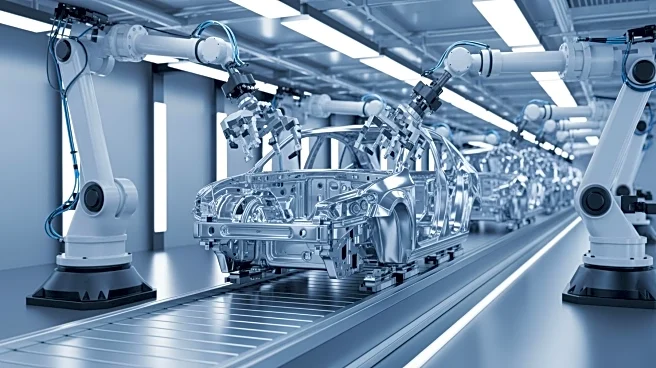What's Happening?
Toyota has announced a 7.4% increase in its global production figures for the second quarter of the 2025/26 fiscal year. This growth is primarily attributed to strong sales in North America, where the company
delivered nearly 738,000 units, marking a 15.3% year-on-year increase. The automaker's performance in this region has been bolstered by the rising demand for hybrid vehicles, which aligns with broader consumer trends towards more environmentally friendly transportation options. The production boost reflects Toyota's strategic focus on expanding its market share in North America, a key region for automotive sales.
Why It's Important?
The increase in Toyota's production is significant as it highlights the growing consumer preference for hybrid vehicles in North America, a trend that could influence the automotive industry's future direction. This shift towards hybrid and potentially electric vehicles is crucial for reducing carbon emissions and meeting environmental targets. For Toyota, the production increase not only strengthens its position in the competitive North American market but also underscores its commitment to sustainability. The automaker's success may prompt other companies to accelerate their own hybrid and electric vehicle offerings, potentially reshaping the industry landscape.
What's Next?
Toyota's continued focus on hybrid vehicles suggests further investments in technology and infrastructure to support this segment. The company may also explore expanding its production capacity to meet the growing demand. Additionally, Toyota's success could lead to increased competition among automakers, prompting innovations in vehicle design and efficiency. Stakeholders, including environmental groups and policymakers, may push for more stringent regulations to encourage the adoption of hybrid and electric vehicles, influencing future automotive industry standards.
Beyond the Headlines
The rise in hybrid vehicle sales reflects broader cultural shifts towards sustainability and environmental consciousness. As consumers become more aware of their carbon footprint, automakers are likely to face increased pressure to innovate and offer greener alternatives. This trend could lead to significant changes in urban planning and transportation infrastructure, as cities adapt to accommodate more eco-friendly vehicles.









